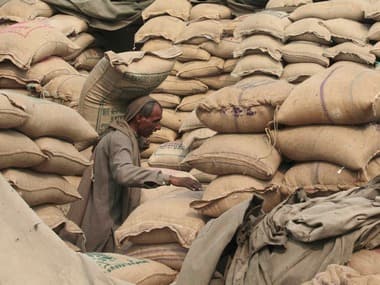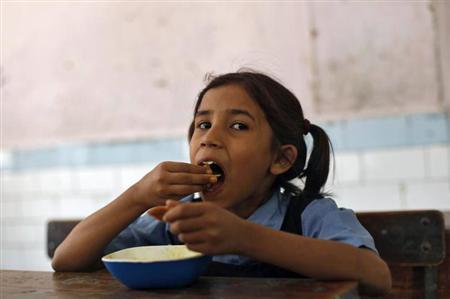Raipur/Patna: The deaths of at least 23 children who were poisoned after eating a free school meal has triggered an outcry over food safety just as the ruling Congress party is set to launch an ambitious plan to feed 800 million poor, with an eye on elections due within a year. Congress leader Sonia Gandhi’s national subsidised food project includes free school meals and expands existing handouts to make it probably the biggest welfare initiative since India gained independence in 1947. “It’s a political move designed to garner support for Congress among the poor, which has been its traditional constituency,” said Zoya Hasan, a professor at the School of Social Sciences in New Delhi’s Jawaharlal Nehru University. The National Food Security Ordinance aims to give five kg of cheap grain every month to 800 million people and more than doubles the reach of the existing subsidised food system, whose failings still mean the country is home to a quarter of the world’s hungry. But the school tragedy in Bihar, highlights the potential dangers of rolling out a major food distribution scheme without strict monitoring of supplies and quality and having to hand responsibility to local authorities, many of whom have weak administration. [caption id=“attachment_968565” align=“alignleft” width=“380”]  How will the food security plan be implemented? Reuters[/caption] In Bihar, the children’s deaths prompted protesters to burn effigies of Chief Minister Nitish Kumar, chanting slogans denouncing the state government and setting fire to vehicles. “This terrible tragedy will hopefully serve as a wake-up call for them,” said Reetika Khera, development economist and social activist, adding programmes like this need to be administered at the local level. Currently, nearly half of India’s annual rice and wheat supplies are lost to rot or corruption, and while deaths from contaminated food are rare, many of the country’s poor are offered substandard food, sometimes containing stones and grit. “This (tragedy) does throw light on food quality in public programmes,” said Dipa Sinha, Right to Food researcher and activist. “It is clearly a failure of monitoring and accountability.” Under Gandhi’s food welfare plan, grain distribution will be devolved to local communities, but critics say few details have been revealed and question how the scheme will be administered. The Bihar tragedy may raise more questions over Gandhi’s plan. The Congress party, which controls only half of India’s 28 states, won the last two elections after introducing populist policies such as a rural jobs plan and a $12.5 billion farmer loan waiver. The food security bill, Gandhi’s pet project, was approved on July 3 using executive orders, usually reserved for urgent policy. Gandhi plans to launch the programme on 20 August, the birthday of her late husband and former prime minister, Rajiv. Parliament must decide whether to agree or reject the measures within six weeks of the next session’s start on Aug 5. While opposition parties and some government allies complained about the decision to use an executive order to drive the plan through, the bill is expected to be approved. Under the scheme India, one of the world’s largest food producers and consumers, will buy about 30 percent of its 198 million tonnes of rice and wheat output to sell at subsidised prices. The scheme will cost an estimated $22 billion a year. Rotting food At a warehouse in Naubatpur village, one of the storage hubs for grain in Bihar, pigs grunt and squeal in filthy pools of water that lap at rotting rice spilt from hessian bags. Farmer Shambu Sharma picks up a handful of the black, stinking grain that has not yet reached the poor and shakes his head as it spatters his white trousers. “This all comes back to the villages for distribution,” he said, dismayed the rice he had grown was now virtually inedible. Bihar’s chief minister Kumar, not a Congress party member, has succeeded in reviving the state’s economy since coming to power in 2005, but has struggled to feed the millions of poor due to continuing corruption and a lack of storage. In 2011, only 18 percent of people living below the poverty line in Bihar received their subsidised grain rations, according to a survey by a team led by development economist Jean Dreze. Under Gandhi’s welfare food project, Bihar will have to distribute 7.2 million tonnes of grain per year, double what it now handles, yet it lacks adequate storage. It is building more warehousing but it will not be completed before the election. But Kumar is slowly making progress and, in a warning for Gandhi, it is the chief minister and not Congress that is winning praise among farmers and beneficiaries for the efforts. Bihar has issued coloured coupons to the poor, which has started to ensure cheap grain reaches the most needy, and in turn improved the livelihoods of some voters. “Since the government has issued coupons, it has been easier to buy from ration shops and I end up saving what I used to spend on buying from the open market,” said cycle rickshaw driver Daud Hussain. “With the savings, I can buy a new school uniform for my daughter,” added Hussain, who now saves about 50 rupees from earnings of about 250 rupees a day. India’s ‘rice saint’ In another state, Chhattisgarh, Chief Minister Raman Singh is known as “the rice saint” for his success in tackling corruption and red tape to deliver food to the poor. His efforts have also paid political dividends, helping him get re-elected in 2008. Singh has dramatically improved the state’s grain distribution using technology to track supplies closely and giving local community groups rather than private dealers the responsibility to provide the cheap grains to village residents. He has also put state finances into the scheme to raise the price paid to farmers for harvests, reduced even further the cost to consumers of the subsidised grains, increased the number of people eligible, and added protein-rich lentils to the menu. In 2011, 97 percent of Chhattisgarh’s poor received their allotted grain, according to Dreze, the economist. “This is a matter that concerns the whole country,” Singh, who is not a Congress party member, told Reuters. “If they replicate our state’s model, there won’t be a need for a debate. Everyone would agree with this.” In Seoni village on the outskirts of Chhattisgarh’s capital Raipur, Dhanush Kumar Sahu sits among sacks of wheat and rice, weighing rations for a stream of women who come clutching tattered ID cards in gnarled hands to his shop. Sahu is at the retail end of a closely-monitored supply chain that takes grain from farmers’ fields, moves it to government-owned warehouses and distributes the sacks in government trucks to his door. Rice is sold at 1-2 rupees (1.6-3.2 U.S. cents) per kg depending on need - less than the federal government’s subsidised level of 3 rupees per kg - and it covers more people than targeted by New Delhi even with the proposed expansion. “Since the rates have changed, everyone comes to take the rice,” Sahu said, while a customer ran rice through her fingers to check its quality. Reuters
The school tragedy in Bihar, highlights the potential dangers of rolling out a major food distribution scheme without strict monitoring of supplies and quality and having to hand responsibility to local authorities
Advertisement
End of Article
Written by FP Archives
see more


)

)
)
)
)
)
)
)
)



